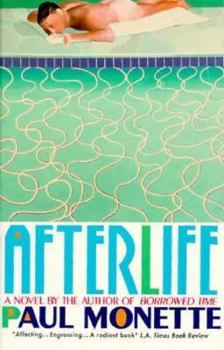Afterlife
Select Format
Select Condition 
Book Overview
/Paul Monette Set against the big-city backdrop of Los angeles, Afterlife is a powerful novel of three AIDS widowers, all of whom lost their lovers in the same week--and who now must. This description may be from another edition of this product.
Format:Paperback
Language:English
ISBN:0380711974
ISBN13:9780380711970
Release Date:January 1991
Publisher:Quill
Length:278 Pages
Weight:0.64 lbs.
Dimensions:0.8" x 5.3" x 8.0"
Customer Reviews
3 ratings
Life after death
Published by Thriftbooks.com User , 20 years ago
With an eloquence enhanced by experience, Paul Monette (1945-1995) presents the story of three "widowers," gay men whose lovers died of AIDS in a hospital within days of each other. The survivors have little in common, yet their shared tragedy, subsequent get-togethers, and a series of events throw them all under the same roof. In the center of this trio is Steven Shaw, whose home provides the oasis of last resort for the men and their friends. Grieving and calloused, depressed and moody, Steven attempts to combat his indifference towards the travel agency he owns, remoteness from an employee who is close to death, and disinterest in the possibility of a new relationship. His journey is aided by Margaret, who runs his business in his absence and cares for the dying Ray, and by Mark, a Hollywood executive with whom he unexpectedly falls in love. Steven's fellow survivors are less centered and more erratic, however. Dell Espinoza allows his anger and grief to degenerate into an obsessive aggression towards an uncaring society and he funnels his hostility towards acts of vandalism, reserving his most vicious attacks for a loathsome, gay-hating evangelist. Not even a loving, empathetic sister Linda can save Dell from his own fury. Stunningly attractive and hopelessly shallow, Sonny Cevathas (the third widower) deals with his grief by ignoring it altogether. Discounting his own health problems as minor inconveniences, believing that New Age trickery and "positive thinking" can halt his own demise, and searching for a rich man to immerse him in undeserved luxury, Sonny is the book's most wicked (although, I'm afraid, scarily accurate) portrayal of one of many men who fooled themselves into initially believing that AIDS could be simply wished away. Depression, anger, and denial--the paths taken by these three incompatible friends--are rarely so clearly demarcated as they are in Monette's characters. (Dell especially represents an extreme that is, thankfully, scarce.) But the author injects his tale of loss and sorrow with enough humor and affection to keep it from the edge of hopelessness. Not just a book about death and dying, "Afterlife" is, more than anything, a book about learning to live again.
After Borrowed Time
Published by Thriftbooks.com User , 22 years ago
What happens to all those friendships formed among the relatives of the dying in intensive care wards? This excellent novel explores some of the options through believable characters and a thrilling plot. If you've read Borrowed Time -- surely one of the better books I've read -- you should treat yourself to this book. It's much lighter; but Monette's tact doesn't lose its point.
A powerful look at what happens to those left behind
Published by Thriftbooks.com User , 27 years ago
"Afterlife" by Paul Monette struck me in many ways. It made me realize what happens to the living after those we love so much are gone. It is disturbing in an eye-opening way, and as one reviewer stated, revolutionary in its own right. The characters are well formed, not sterotypical, and show how any human can react to a loss of a loved one to something so meaningless.... Gay or straight in so much of it is not relevant. It more than anything else I have read, shows the devestation and the legacy that AIDS has left behind.






